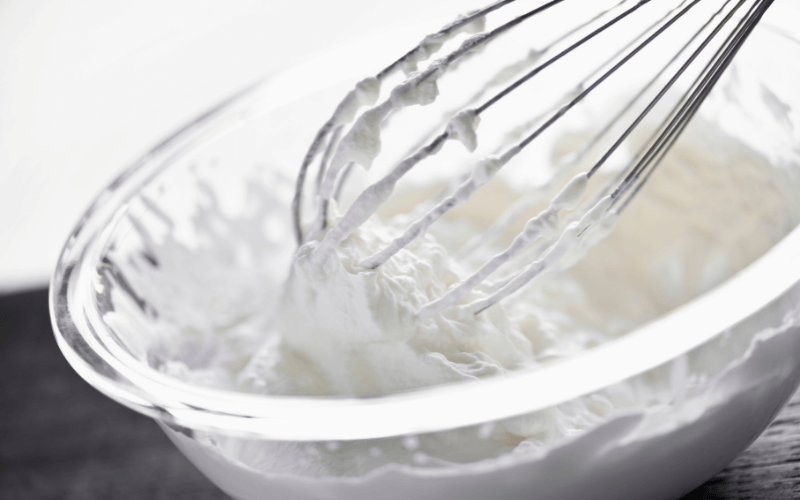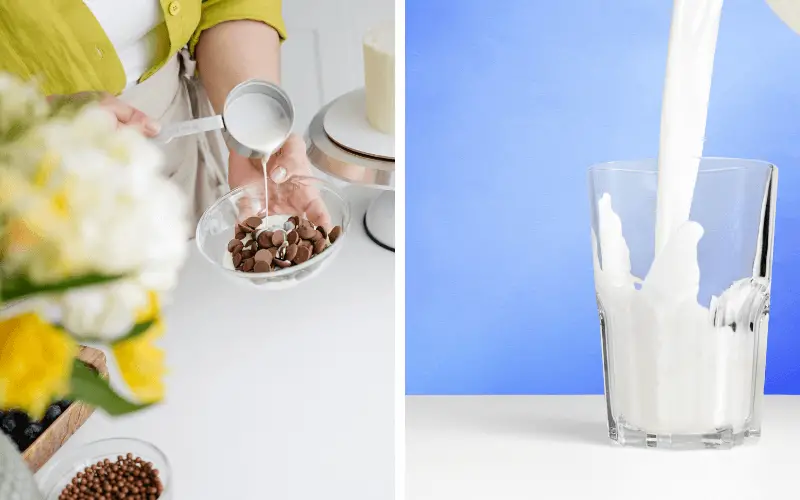While originating from the same source, whole milk and heavy cream exhibit distinct characteristics that set them apart from each other.
This article covers the primary differences of these two dairy products to help you better utilize them in the kitchen or for your health. We hope you leave here with a better understanding of these dairy essentials!
Uses
Heavy cream is primarily used to add richness and thickness to dishes. It is often used in desserts, whipped cream toppings, creamy sauces, and soups where a velvety texture is desired. Due to its higher fat content, it can provide a pleasing mouthfeel while also enhancing the flavors of dishes.
Whole Milk really needs no explanation given its popularity. However, common uses include drinking it directly as a beverage, adding it to breakfast cereal, and making baked goods. It is used to make hot chocolate, smoothies, certain cocktails, cheeses, and yogurts. We could go on and on. Its relatively thin texture makes it suitable for incorporating into various dishes without overwhelming them with richness.
Nutrition
The table below reflects the nutrition facts for Kroger Heavy Cream versus Kroger Whole Milk. While there are certainly other brands of heavy cream and whole milk, the nutrition facts below are generally similar to other brands.
At a glance, you might think that the nutrition facts for the heavy cream are relative tame. However, take note of the differences in serving sizes between the cream and milk. These are the servings listed on the product containers and represent a realistic serving that people commonly consume in a sitting.
If someone were to consume the same 8 fluid ounce serving size heavy cream as the whole milk, this is a summary of what they would be consuming: Calories 800, Total Fat 80g, Saturated Fat 56g, Cholesterol 320mg, Carbs 16g.
You don’t need to be a nutrition expert to understand the vast nutritional differences of these dairy products based on what we have outlined. Furthermore, it should be easy to understand why its not a good idea for most people to routinely consume large quantities of heavy cream.
| Kroger – Heavy Whipping Cream | Kroger – Whole Milk | |
|---|---|---|
| Serving Size | 1 tbsp (15mL) | 8 fl. oz. (240mL) |
| Calories | 50 | 150 |
| Total Fat | 5g | 8g |
| Saturated Fat | 3.5g | 5g |
| Trans Fat | 0g | 0g |
| Cholesterol | 20mg | 35mg |
| Sodium | 5mg | 105mg |
| Total Carbohydrate | 1g | 12g |
| Dietary Fiber | 0g | 0g |
| Sugar | 1g | 12g |
| Added Sugar | 0g | 0g |
| Protein | 0g | 8g |
| Calcium | 10mg, 0% DV | 290mg, 20% DV |
| Iron | 0mg, 0% DV | 0mg, 0% DV |
| Potassium | 20mg, 0% DV | 370mg, 8% DV |
| Vitamin D | 0.1 mcg, 0% DV | 2.5mcg, 10% DV |
Fat Content & Whipping Capabilities

While whole milk has a creamy flavor to it, you could whip it all day without producing whipped cream. Whole milk contains 3.25% milkfat by weight, which is not enough fat content to enable it to whip on its own.
You’d have to add a thickener to it, such as gelatin, to get desirable results of actual whipped cream. You can see how whole milk can be transformed into whipped cream in the video below from Bigger Bolder Baking.
As its name implies, heavy whipping cream whips up beautifully into whipped cream without the need for thickeners. Heavy cream that is found in U.S. grocery stores has at least 36% milkfat content, which is the reason it is great for not only whipping but also thickening foods.
Simply pour the heavy cream into a bowl, add sugar and vanilla to taste, and whip the ingredients until the desirable thickness is reached.
Live Free shows you how to make whipped cream from heavy cream in the video below. If you don’t have a stand mixer like in the video, you can use an electric hand mixer or even a hand whisk if you are willing to put in some labor.
Texture
Milk has a relatively thin and smooth texture. It is liquid in form and has a consistency that falls between water and thicker substances. When poured, it flows easily and evenly. It’s not as thick as heavy cream, which has a much higher fat content.
Heavy Cream has a much thicker and richer texture compared to milk. It is significantly more viscous and has a smooth, velvety feel.
You’ll undoubtedly know the difference in thickness if you accidently drink heavy cream instead of milk. The thickness of heavy cream is unmistakable not to mention the blast of creaminess you’ll likely be surprised by if you are expecting milk.

